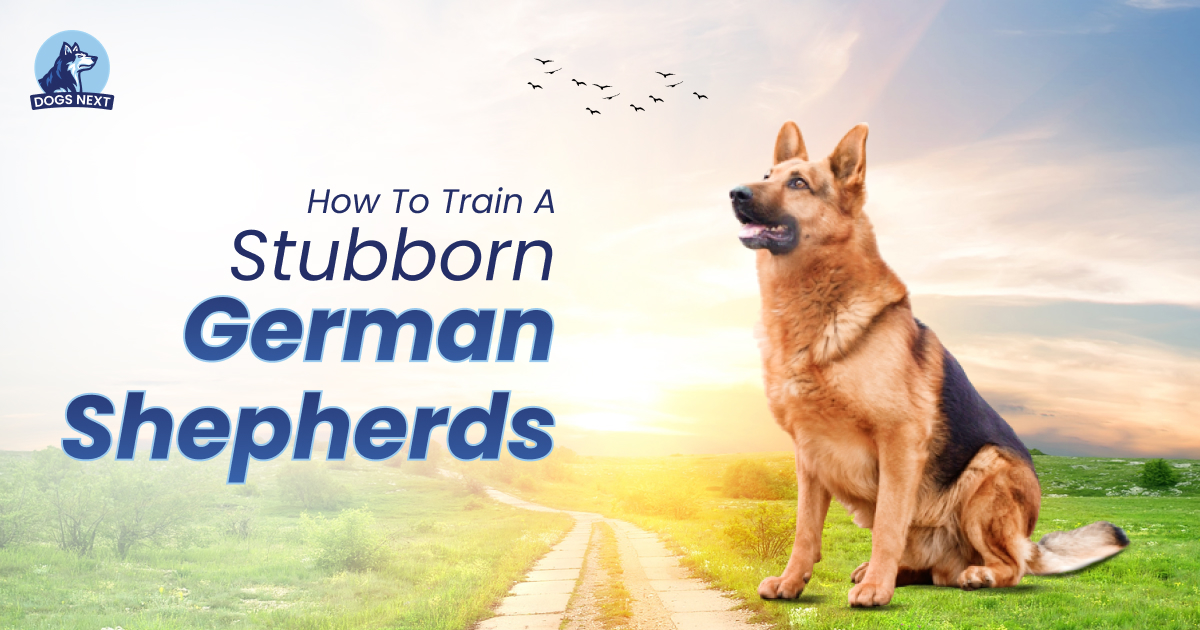German Shepherds are a popular and intelligent breed known for their loyalty and protective nature. Their strong-willed nature can sometimes make training a challenge, especially when dealing with stubborn behavior.
Training a stubborn German Shepherd requires patience, consistency, and positive reinforcement. Here are some steps to help you train your stubborn German Shepherd: Establish yourself as the leader, Start with basic obedience commands, Use positive reinforcement, Be consistent, Keep training sessions short and frequent, and Provide mental and physical stimulation.
In this article, we will explore effective strategies to train a stubborn German Shepherd and provide you with valuable insights to overcome training obstacles. So, let’s start.
How to Train a Stubborn German Shepherd
Training a stubborn German Shepherd requires a thoughtful and patient approach. Here are some key steps to effectively train your furry companion:
| How to Train | Description |
| Creating a positive training environment | Ensure that the training sessions take place in a calm and distraction-free setting. Use positive reinforcement techniques, such as treats and praise, to encourage desired behaviors. |
| Establishing trust and a strong bond | Build a foundation of trust by spending quality time with your German Shepherd. Engage in activities like playtime, exercise, and grooming to strengthen the bond between you and your pet. |
| Setting realistic expectations | Understand that training a stubborn German Shepherd takes time and consistency. Set achievable goals and break the training process into small, manageable steps. Celebrate progress and be patient throughout the journey. |
Understanding Your German Shepherd’s Behavior
To effectively train a stubborn German Shepherd, it’s crucial to understand their behavior. Here are important aspects to consider:
Exploring the characteristics of a German Shepherd
They have a strong work drive and excel in various tasks, making them versatile and trainable. Understanding their inherent traits will help you tailor the training methods accordingly.
Common Challenges in training stubborn German Shepherds
Stubbornness can be a common challenge when training German Shepherds. They may exhibit selective listening, resistance to commands, or test boundaries. Recognizing these challenges allows you to approach training with patience and find effective solutions.
Identifying underlying causes of stubbornness
Stubborn behavior in German Shepherds can stem from various factors, such as fear, anxiety, or a lack of motivation. By identifying the underlying causes, you can address them appropriately and adjust the training methods accordingly.
Positive Reinforcement Training Methods
When it comes to training a stubborn German Shepherd, positive reinforcement is a highly effective approach. Some key aspects to consider:
- The effectiveness of positive reinforcement: Positive reinforcement involves rewarding desired behaviors to encourage their repetition. This method focuses on praise, treats, and rewards, creating a positive association with training and motivating your German Shepherd to cooperate willingly.
- Using rewards and treats to motivate your German Shepherd: Treats and rewards serve as powerful incentives during training sessions. By offering tasty treats or favorite toys, you can reinforce good behavior and create a strong bond between you and your dog.
- Clicker training and its benefits: Clicker training is a popular technique that utilizes a small device to make a distinct clicking sound. This sound marks the desired behavior and is followed by a reward. Clicker training helps in precise timing and clear communication with your German Shepherd, leading to faster learning and improved focus.
Basic Commands and Obedience Training
Teaching your German Shepherd essential commands and establishing obedience is crucial for their safety and well-being.
Teaching essential commands (sit, stay, come, etc.)
Start with basic commands like sit, stay, come, and down. Use consistent verbal cues and hand signals while rewarding your dog for following instructions. Gradually increase the difficulty level and reinforce these commands in different environments.
Leash training and walking etiquette
Leash training is vital for proper control during walks. Teach your German Shepherd to walk politely on a leash, without pulling or lunging. Encourage good leash manners and reward calm behavior. Practice regular walks to reinforce obedience and reinforce the bond between you and your dog.
Building a Foundation of obedience
Obedience training goes beyond basic commands. Focus on impulse control, such as waiting patiently at doors, not jumping on people, and maintaining a calm demeanor. This foundation of obedience helps your German Shepherd become a well-behaved and disciplined companion.
Addressing Stubborn Behavior Challenges
Dealing with stubborn behavior is a common hurdle in training German Shepherds. Few strategies to overcome such challenges:
Dealing with selective listening and distractions
German Shepherds may display selective hearing, especially in distracting environments. Use high-value rewards, eliminate distractions, and gradually increase the difficulty level to improve focus and responsiveness.
Overcoming resistance to commands
If your German Shepherd resists following commands, it’s essential to stay patient and persistent. Break down the training into smaller steps, offer clear guidance, and reward small successes. Consistency and positive reinforcement will help overcome resistance.
Problem-solving common behavioral issues
Stubborn behavior can manifest in various ways, such as excessive barking, digging, or separation anxiety. Identify the underlying causes, provide mental and physical stimulation, and address the root of the issue through appropriate training techniques and professional guidance if needed.
Socialization and Behavioral Training
Socialization plays a crucial role in shaping a well-rounded and balanced German Shepherd. Here are key points to consider:
The importance of socializing a German Shepherd
Socialization helps your German Shepherd become comfortable and confident in various situations. Expose them to different people, animals, and environments from an early age to prevent fear or aggression issues later on.
Introducing your dog to new people, animals, and environments
Gradually expose your German Shepherd to new experiences, including meeting unfamiliar people, interacting with other dogs, and encountering different environments. Use positive reinforcement and rewards to create positive associations.
Correcting aggressive or fearful behavior
If your German Shepherd displays aggressive or fearful behavior, it’s crucial to address it promptly. Seek professional help to assess the situation and implement appropriate behavior modification techniques. Positive reinforcement and desensitization can be effective in correcting these behaviors.
Advanced Training Techniques
- Engaging your German Shepherd’s intelligence and instincts: Provide mental stimulation and tasks that tap into their natural instincts to keep them engaged and fulfilled.
- Teaching more complex commands and tricks: Challenge your German Shepherd by teaching them advanced commands and tricks, reinforcing their training foundation.
- Agility training and mental stimulation: Set up an agility course to improve coordination, focus, and physical fitness while providing mental stimulation.
Seeking Professional Help
- When to consider professional dog training assistance: If you encounter persistent behavior problems or difficulties in training, it may be beneficial to seek professional help.
- Finding reputable trainers or behaviorists: Research and select trainers or behaviorists experienced in working with German Shepherds, considering qualifications and recommendations.
- Supplementing your training efforts with professional guidance: Periodic consultations with professionals can fine-tune your techniques, address specific challenges, and ensure success in training.
Frequently Asked Questions
Q: How do I discipline my German Shepherd?
Ans: Discipline your German Shepherd through positive reinforcement, consistent training, and setting clear boundaries. Avoid harsh punishment and focus on redirecting their behavior towards desired actions.
Q: How do you train a German Shepherd that doesn’t listen?
Ans: When training a German Shepherd that doesn’t listen, reassess your training methods, ensure consistency, and reinforce commands with positive rewards. Seek professional guidance if needed to address any underlying issues.
Q: Are German Shepherds difficult to train?
Ans: German Shepherds are intelligent and eager to please, but they can be challenging to train due to their independent nature and high energy. With proper techniques, patience, and consistency, they can become well-trained companions.
Q: Why is my German Shepherd disobedient?
Ans: Disobedience in German Shepherds can stem from various factors, such as inadequate training, inconsistent handling, lack of socialization, or underlying health issues.
Q: Training a German Shepherd puppy to come when called?
Ans: Start by using a consistent recall command, such as “come” or their name, and reward them with praise and treats when they respond. Practice in controlled environments and gradually increase distractions. Make coming to you a positive and rewarding experience.
Q: How to discipline a German Shepherd for biting?
Ans: Redirect their biting behavior to appropriate chew toys and discourage biting by saying “no” firmly and providing an alternative behavior. Seek professional help if biting behavior persists or becomes aggressive.
Conclusion
In conclusion, training a stubborn German Shepherd requires patience, consistency, and an understanding of their unique characteristics. By creating a positive training environment, establishing trust, and setting realistic expectations, you can lay the foundation for successful training. Utilizing positive reinforcement techniques, teaching basic commands, addressing stubborn behavior challenges, and providing socialization and advanced training techniques, you can guide your German Shepherd toward becoming a well-behaved and obedient companion.
However, if you encounter persistent difficulties, don’t hesitate to seek professional help from reputable trainers or behaviorists. With dedication and the right approach, you can train a stubborn German Shepherd and foster a strong bond built on trust and mutual respect. Remember, training a stubborn German Shepherd is a rewarding journey that strengthens the human-canine bond and leads to a harmonious relationship based on trust and obedience. Good luck!

I’m David, an expert contributor and writer, with two furry friends of my own, I know the challenges of raising and caring for dogs. From training to nutrition and health, my goal is to provide valuable insights and advice to help create strong bonds and happy, healthy lives. Find me in Twitter.




